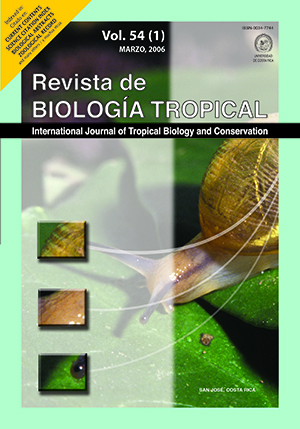Resumen
La cinética de la biodegradación de los ésteres metílicos y etílicos derivados de palma (biodiesel) por una población silvestre de bacterias aeróbicas fue medida a 20°C, como medición manométrica del consumo de oxígeno. Los ésteres metílicos y etílicos se obtuvieron por transesterificación del aceite de palma con metanol y etanol, respectivamente. La flora bacteriana incluyó a los géneros Bacillus, Proteus, Pseudomonas, Citrobacter y Enterobacter. Las velocidades de consumo de oxígeno para las muestras de biodiesel fueron similares a lo observado en la biodegradación de disoluciones 1.0 mM de sustratos sencillos solubles en agua, tales como carbohidratos, aminoácidos y albúmina de huevo.##plugins.facebook.comentarios##

Esta obra está bajo una licencia internacional Creative Commons Atribución 4.0.
Derechos de autor 2006 Revista de Biología Tropical
Descargas
Los datos de descargas todavía no están disponibles.


